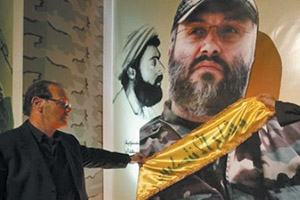
Besides the meaning for the people of Israel and for Netanyahu, the media reports of the joint Mossad-CIA mission also serve Israeli security interests.
It is hard to believe that the timing was coincidental.
Whoever leaked the details of the 2008 joint Mossad-CIA assassination of Hezbollah operational chief Imad Mughniyeh to two US newspapers, and certainly to a paper like The Washington Post, (the second one was Newsweek), did not do so capriciously. Most likely someone wanted to send the following message to the people of Israel and also to Prime Minister Benjamin Netanyahu: You need us. Look at the extent of the cooperation between our intelligence communities, which risks being damaged due to the discordant policies of your prime minister. This was the nature of the hidden message behind the leaked assassination operation.
The leak is surprising because the US usually only confirms its clandestine operations if it takes responsibility for them. In the case of Mughniyeh, neither the US nor Israel claimed responsibility. And there remains room for denial because the source of the leak was an anonymous US official and not an official government statement. The actual details of the leak are less important, and we shall see that some of them are lacking in accuracy.
The impression given from the leaked details is that someone wanted the US to take the lion’s share of the credit for the Mughniyeh assassination. According to the media reports, in the joint operation that killed Hezbollah’s “defense minister,” the Mossad played second fiddle to the CIA who was the senior more central partner. It’s possible that this is a great exaggeration, the truth was entirely different and in fact the Mossad was the dominant player in the operation.
The impression of the Mossad’s primary role rises from the leaked details themselves. It was reported that it was the Mossad who provided the intelligence on Mughniyeh’s movements in Damascus where he had a secret residence. Also, according to the reports, the idea to assassinate Mughniyeh was the brainchild of the head of the Mossad at the time, Meir Dagan. It was noted that the US military and intelligence officials also raised the possibility of assassinating the Hezbollah figure with whom they had an open account for having the blood of hundreds of Americans on his hands.
But for Israel, which followed Mughniyeh’s movements for many years, he was a more important target than he was for the US. According to the report, even though the explosive device in the operation was tested and built in the US, the detonation device was in the hands of the Israelis in Tel Aviv.
A tone of American pride could be heard in the report over the fact that the CIA agents were present in Damascus during the mission. It can be assumed that if the Mossad was a partner in the operation members of its Kidon unit also had a significant on-site presence, as has been published in foreign publications, including in my book co-authored with the American journalist Dan Raviv, Spies Against Armageddon: Inside Israel’s Secret Wars.
Usually, in highly sensitive assassination operations, the Mossad prefers “blue and white” solo executions, meaning working alone, without partners. Only in rare cases, when the two countries have mutual interests in eliminating the target and they can keep it as a secret without any legal or international implications, or when Israeli intelligence fails to have access, would they then turn to a partner. But, this does not mean that there is no sharing of information and intelligence on targets, without cooperation in fulfilling the ultimate goal.
The reports also mentioned the involvement of Jordanian intelligence. This is also unsurprising for those familiar with the intimate ties between the states. In contrast to what was written in the report, Mughniyeh was not killed shortly after finishing dinner at a Damascus restaurant, but rather after meeting with his mistress.
Israel’s role in the mission was likely larger than the US role, but there is no battle over credit in this joint operation. Even with the hidden message to the people of Israel and to Netanyahu with the leaking of the details at this time, the report can serve Israel’s security interests as well. The report presents a challenge to Hezbollah and sends it, and Iran, a difficult message: Your conflict is not only with Israel it is also with the US.
Yossi Melman is an Israeli journalist and writer who specializes in security and intelligence affairs. He is co-author of “Spies Against Armageddon: inside Israel’s Secret Wars.
By Yossi Melman/www.jpost.com









